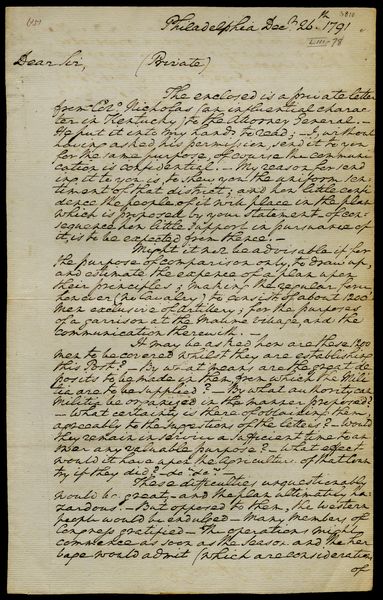Washington, George (1732-1799) to Henry Knox
High-resolution images are available to schools and libraries via subscription to American History, 1493-1943. Check to see if your school or library already has a subscription. Or click here for more information. You may also order a pdf of the image from us here.
A high-resolution version of this object is available for registered users. LOG IN
Gilder Lehrman Collection #: GLC02437.09423 Author/Creator: Washington, George (1732-1799) Place Written: Philadelphia, Pennsylvania Type: Autograph letter signed Date: 26 December 1791 Pagination: 2 p. ; 32.3 x 20 cm. Order a Copy
Transmits a letter from Colonel Nicholas, who Washington describes as an "influential character in Kentucky." Sends Knox the letter without asking Nicholas's permission. Notes that the transmitted letter pertains to the lack of confidence the citizens of Kentucky would have in a militia plan Knox recently proposed. Advises Knox to create a plan, if only for comparison, based upon Kentucky inhabitants' wishes, allowing for a regular force of 1200 men. Discusses the details of organizing a militia in Kentucky. Cites benefits of the military plan, noting "if the War can be terminated by such operations the expence would be much less." Letter marked "Private" at the top of page one.
Washington was possibly referring to the Northwest Indian War (1785-1795), also known as Little Turtle's War.
Signer of the U.S. Constitution.
Philadelphia Dec.r 26.th 1791
Dear Sir, (Private)
The enclosed is a private letter from Col.o Nicholas (an influential character in Kentucky) to the Attorney General. - He put it into my hands to read; - I, without having asked his permission, send it to you for the same purpose, of course the communication is confidential. - My reason for sending it to you is, to shew you the uniform sentiment of that district; and how little confidence the people of it will place in the plan which is proposed by your statement - of consequence how little support in pursuance of it, is to be expected from thence. -
Might it not be advisable if for the purpose of comparison only, to draw up, and estimate the expence of a plan upon their principles; making the regular force, however (no Cavalry) to consist of about 1200 Men exclusive of Artillery; for the purposes of a garrison at the Maume village, and the communication therewith. -
It may be asked how are these 1200 men to be covered whilst they are establishing this Post? - By what means are the great deposits to be made in them, from which the Militia are to be supplied? - By what authority can Militia be organized in the manner proposed? - What certainty is there of obtaining them, agreeably to the suggestions of the letters? - Would they remain in service a sufficient time to answer any valuable purpose? - What effect would it have upon the Agriculture of that Country if they did? - &ca. &ca. -
These difficulties unquestionably would be great - and the plan ultimately hazardous. - But opposed to them, the Western people would be endulged - Many Members of Congress gratified - The operations might commence as soon as the Season and the herbage would admit (which are considerations of [2] of great importance) - Many difficulties with respect to appointments avoided - And, if the War can be terminated by such operations the expence would be much less. -
I am Yours, Affectly & sincerely
Go: Washington
PS.
Return the enclosed to me early in the morng.
Majr. Genl. Knox
Citation Guidelines for Online Resources
The copyright law of the United States (title 17, United States Code) governs the making of photocopies or other reproductions of copyrighted material. Under certain conditions specified in the law, libraries and archives are authorized to furnish a photocopy or other reproduction. One of these specific conditions is that the photocopy or reproduction is not to be “used for any purpose other than private study, scholarship, or research.” If a user makes a request for, or later uses, a photocopy or reproduction for purposes in excess of “fair use,” that user may be liable for copyright infringement. This institution reserves the right to refuse to accept a copying order if, in its judgment, fulfillment of the order would involve violation of copyright law.
